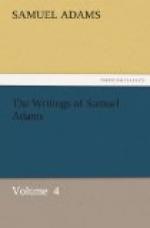Your Recommendation first gaind him the Confidence of Congress and your repeated Favor will still be a substantial Advantage to him.
I most heartily congratulate you on the Return of Peace with Liberty & Independence.—Blessings for which Patriots have toiled & Heroes fought & bled. Our Country may now be happy if she is not wanting to her self. We have done our Duty. Future Generations can never curse the present for carelessly surrendering their Rights.
I beg you, my Friend, not to impute my long Silence to a faulty Cause. If you believe me to be a Man of Truth, be assured that I have constantly participated with you in good & ill Fortune. I shall ever rejoice that you was honord by Providence, in captivating Burgoyne & his whole Army—An Event which wrought the most happy Change in the Face of our Affairs in Europe, and which alone, in Spite of Envy, will give you a brilliant Page in History.
Mr Yancey is gone to South Carolina. I have written by him to my old Patriotick friend Gadsden and the stronger to enforce my Recommendation of Mr Yancey have mentiond him as one whom you regard.
Oblige me with your Letters for I am sincerely and affectionately
Your Friend
& very humble Servant,
TO ELBRIDGE GERRY.1
[J. T. Austin, Life of Elbridge Gerry, vol. i., pp. 408-410; a draft is in the Samuel Adams Papers, Lenox Library.]
Boston, Sept. 9, 1783.
My dear sir,
This is the first letter I have been able to write since I had the pleasure of seeing you, excepting a short one to our delegates, informing them that the general court had appointed a committee to correspond with them. Mr. Appleton and Mr. Rowe are my colleagues in this business. The correspondence is to be very extensive. “Any other important matter which relates to the being and welfare of the United States!” My bodily illness has prevented my engaging in it. I wish the delegates would begin. The welfare, and perhaps the being of the United States, in my opinion, depends much upon congress possessing the confidence of the people at large; that upon the administration of public affairs being manifestly grounded upon principles of equality and justice, or upon the people being assured that congress merit their confidence. The war is now over, and the people turn their eyes to the disposition of their money, a subject, which I hope congress will always have so clear a knowledge of, as to be able at any time to satisfy the rational enquiries of the people. To prevent groundless jealousies, it seems necessary not only that the principal in that department should himself be immaculate, but that care should be taken that no persons be admitted to his confidence but such as have the entire confidence of the people. Should a suspicion prevail that our high treasurer suffers men of bad principles or of no principles to




